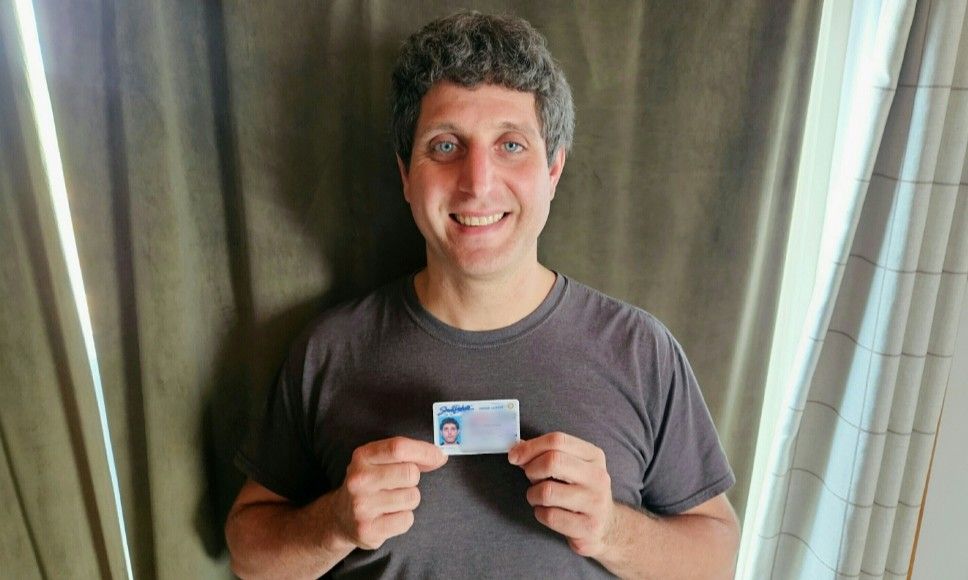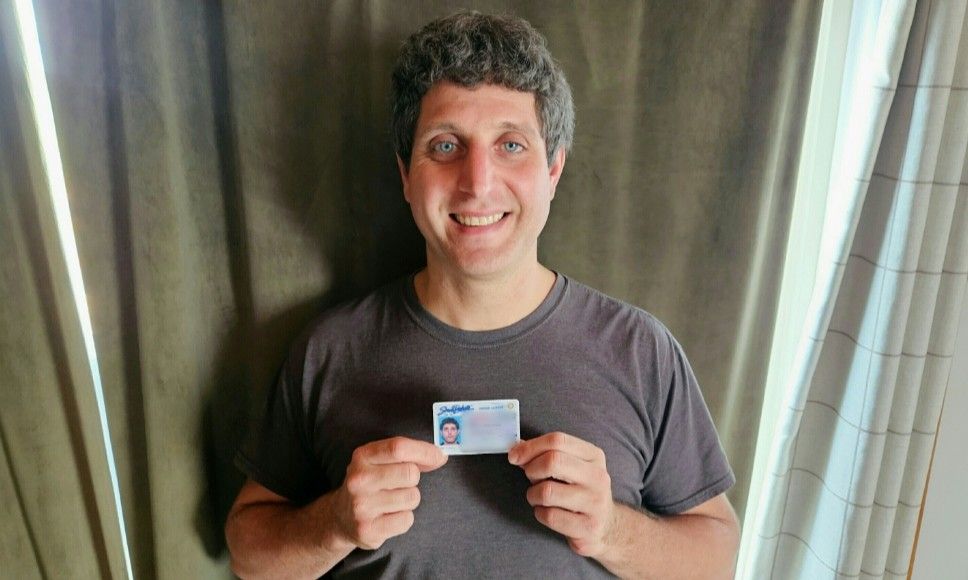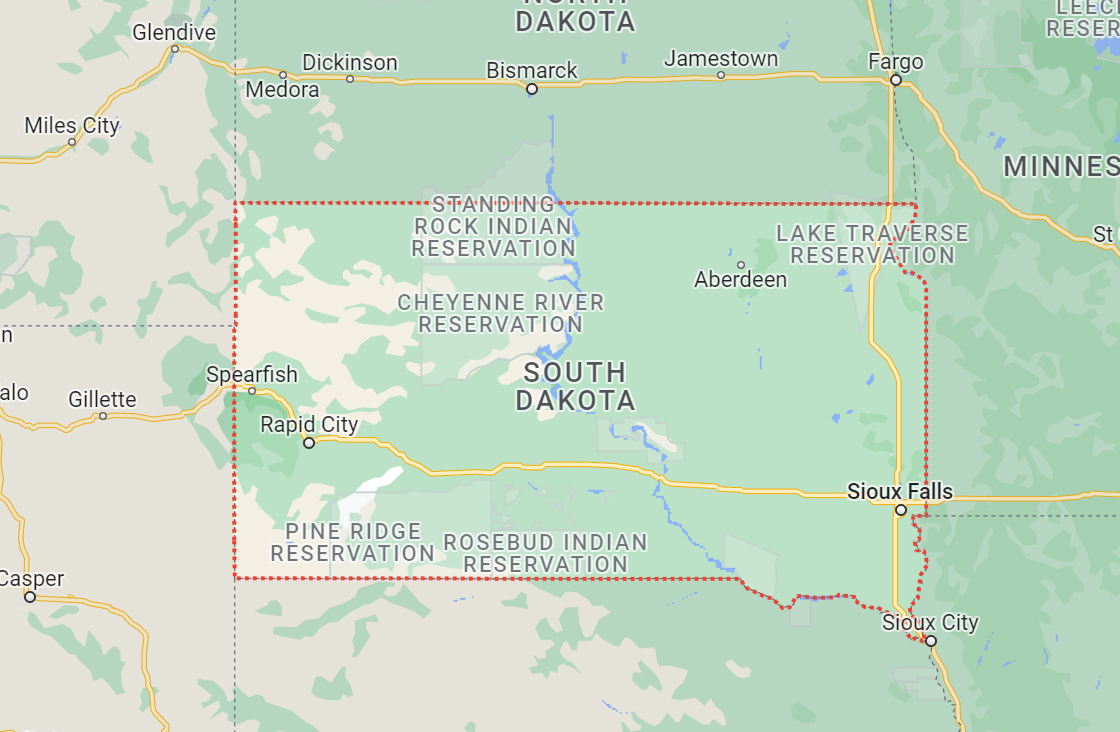I became a South Dakota resident

"Where are you from?"'
It’s one of the questions we get asked all the time, especially when meeting new people on the road. There are always new campground staff and fellow travelers that want to know our backstory. Nicole's answer is straightforward; she was born, raised, and attended college and grad school in Massachusetts. My answer is a little more complicated, as I was born and raised on Long Island, NY, moved to Massachusetts for college, then went to Pennsylvania for grad school, and then returned to MA. At some point after grad school, I'm not sure when, my answer changed from "Long Island" to "Massachusetts." Since hitting the road, though, it's gotten harder to answer. Just saying "Massachusetts" seems to imply that we've both been there our whole lives, so oftentimes the conversation deepens and I end up saying, "Well actually, I'm originally from Long Island." Then there's the added complication of being a full-time RVer. When people walk by our truck and trailer and see MA license plates, they're often perplexed, wondering why we've RVed so far and are staying in random rural campgrounds not near any major destinations.
Then there's the part we don't talk about much. By becoming nomadic, we made the deliberate choice to not live in MA anymore.
So what's the best answer?
Our most common: "Massachusetts, but we're full-time RVing now."
What we want to say when we're feeling like being extra tongue-in-cheek: "Everywhere and nowhere at the same time."
What we want to say when we're not feeling very chatty: "Here."
As if the answer wasn't complicated enough, I just underwent a process that adds a whole new state to my list:
"I'm from South Dakota!"
Yes, that's right. I have no upbringing or history in the state of South Dakota, and I've only spent about 3 weeks there in my entire life, but yet, here I am, a new South Dakota resident.
Up until this point, I only qualified for MA residency on a technicality. When we sold our house, we switched our address over to my in-laws' house for mail, legal and insurance documents, driver's licenses, and so on. But if I hadn't already been a MA resident before that, I likely would not have been able to qualify.
At first glance, what state you live in seems simple. It’s right there in the 14th amendment: "All persons born or naturalized in the United States, and subject to the jurisdiction thereof, are citizens of the United States and of the State wherein they reside." If you’ve ever moved to a new state before, though, you know that there are specific rules for counting as a resident. You qualify after so many days, and have so long to change your documents over, etc. What you may not know is that every state gets to set their own rules about this, and they vary quite a bit from place to place. Massachusetts has pretty strict and sometimes irreconcilable, mutually contradictory rules about residency. I should know, given that they caused me a lot of trouble (and a couple of parking tickets) after college, and again after grad school, the two times I officially moved there. When we first bought our trailer and registered it in MA, our license plate number was only 5 digits and began with the number 1. In other words, not a lot of people register RVs in the state, and unless you're already a Massachusettsan (and sometimes not even then), you're not considering this state for residency when you launch full-time on the road.
If Massachusetts is the least RV-friendly state, then there’s a good case to be made that South Dakota is the most. It’s the only state to have special rules for full-time travelers to become residents and, specifically, to legally establish domicile. Domicile means the state is where you intend to return, even if you’re currently
somewhere else. To establish domicile in SD, if you’re a full-time traveler with no
property elsewhere, all you need to do is the following:
- Have a physical mailing address, which is easy to attain through mail forwarding services like Escapees RV Club, a club that caters to full-time RVers
- Spend 1 night in the state at a hotel or campground
- Sign an affidavit of intent to return (though there's no timeline on it, and there's no rule against changing your mind and not actually doing it)
- If you want to maintain residency for more than a decade, you will need to return to the state to renew your license on that second renewal (your 5-year renewal can be done online)
That's it!
So besides not wanting to be a resident of a state that caters in no way to RVers, why would I make such a drastic decision? There are a lot of advantages. Car insurance rates are lower. You don’t need to come back for annual vehicle inspections, which means one less hurdle in planning our travels. And then, there’s taxes. I work remote, at a company with no offices, so legally I work from my state of residency. Unlike MA, SD has no income tax, no annual personal property tax on vehicles, and a lower sales tax rate. It seems like a no-brainer for saving money on the road.
If you’re wondering if it’s really that easy, though...well, so was I. I’d been planning this for a while, even considering flying to SD for a couple of days last winter when we were spending the holidays in MA, but things got too hectic. The plan remained on my mind ever since, so when I finally got to Rapid City, I made an appointment at the DPS (Department of Public Safety, their DMV equivalent) and started getting my documents together. I poured over the official DPS website instructions, and third party guides on the process. I bought truck and trailer insurance, even though you don’t even need them to start the vehicle registration process here. I packed a bag with more identifying information than I’d ever carried at once before, just in case.

I showed up early for my appointment, expecting a line. There was a room full of
people sitting and waiting. I took a number, and...they called me right away. That was a new experience.
After that, the exchange went something like this:
Me: “Hi, I’m a full-time traveler here to get my SD driver license.”
Them: “I’ll need your current license, proof of social security number, proof of personal mailbox address, receipt from your campground, and residency affidavit.”
I hand them over.
“All right, read the first line on the eye chart. Now stand there for your photo. Ok, that’ll be $28.”
I was in and out in well under 20 minutes with my new license in hand, which was printed for me on the spot.

Registering the truck and trailer is a little more complicated, because one is leased
and the other is financed, but it’s all done online. I asked the bank to start the
process, and then the county department that handles titles emailed me a list of what they needed. I’m still working through that since there are a few documents I need to get copies of, but then they’ll mail me the plates.
Just as easy as registering the RV in Massachusetts, right? Hmm.
Unlike me, Nicole is keeping her MA residency. Her business is incorporated there, so changing it would be a lot more complicated for her. So yes, we live in different
states now, even though we’re less than 28 feet apart most of the time. Laws often don't make practical sense, so we might as well use them to our advantage.
For any travelers thinking of doing the same, there are a few other important
considerations that go into changing residency. First, you have to consider medical care. I’m lucky that I have a health insurance plan with a nationwide network, so I can still go to my MA doctors when I’m back home, and Nicole and I can still be on the same plan. None of those doctors are allowed to talk to me for telehealth appointments anymore due to an antiquated stipulation that requires patients to be butt-in-state in the same state the practitioner is licensed, which causes a lot of problems, but let's face it, laws move at a snail's pace and they're just not cut out for telehealth yet. As such, I did need to change therapists because my MA-licensed one could no longer see me, and so I found a new therapist licensed in SD. Ironically, he doesn’t live there anymore either!
On the topic of therapy, during this process I did also realize that, because Nicole and I are now residents of different states, it would be legally impossible for us to see a couple's therapist via telehealth. We better keep getting along!
Second, some states, especially CA and NY, have a history of investigating people who move to lower tax states. If that’s where you’re coming from, make sure you don’t have ties they can use to claim you’re still a resident there (even something as small as a bank account you didn’t change the address on).
Third, if you’re not an RVer but are still nomadic, opting to stay in hotels and similar accommodations, you might have a harder time getting car insurance without a physical garaging address, though some companies in SD will be fine with it.
So yes, I’m still finishing up all the paperwork, but legally, I’m a South Dakotan now. Turns out, it's actually a better fit than I expected. As we spent 3 weeks in the state, I’ve started learning a lot. No one who knows me will be surprised at how much I appreciate the geology, dinosaur fossils, and frybread! And I can honestly say, whether the state requires me to or not, I definitely do plan to return.


